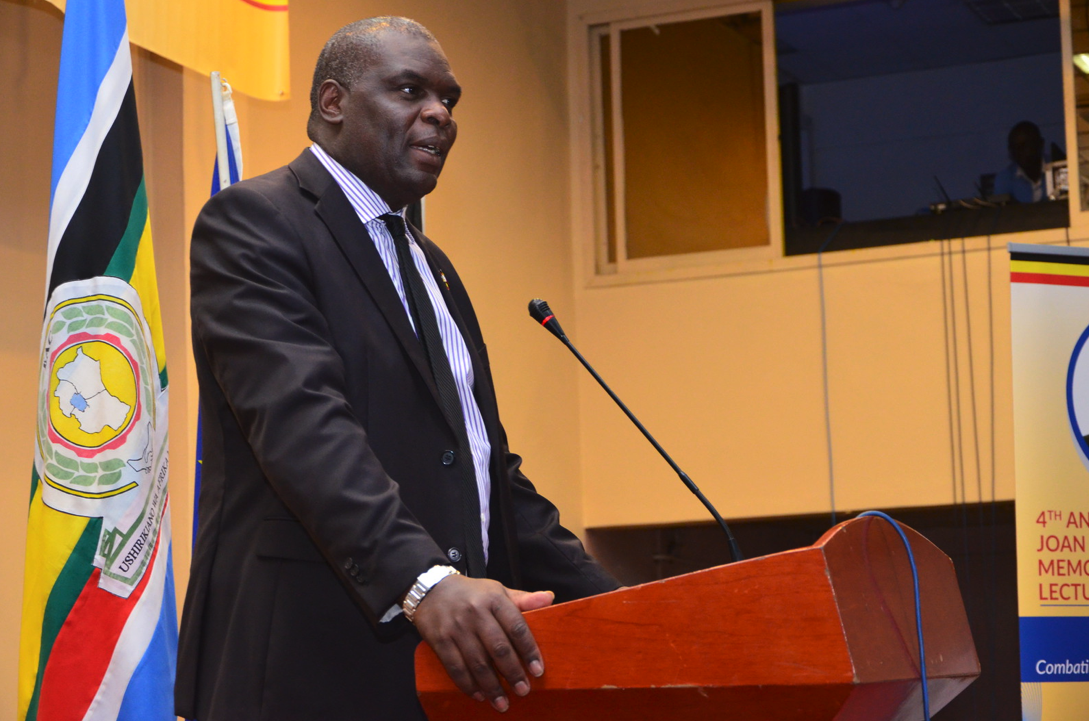
- This event has passed.
4th Annual Joan Kagezi Memorial Lecture
17. April 2019 @ 14:00 - 17:00

4thANNUAL JOAN KAGEZI MEMORIAL LECTURE
17 April 2019
Kampala, Ugandac On 17 April 2019, the Wayamo Foundation, in partnership with the Ugandan Office of the Director of Public Prosecutions (DPP), held the 4thAnnual Joan Kagezi Memorial Lecture in Kampala. The event was organised with the financial support of the European Union.
The 4thAnnual Joan Kagezi Memorial Lecture focused on how national, regional and international actors can harness domestic and international law to better confront and combat impunity for terrorism. Joan Kagezi worked tirelessly to prosecute terrorist crimes but was killed in an act of terror. This made this year’s Annual Memorial Lecture especially timely, since states owe it to champions of justice like Kagezi, not only to bring terrorists to account, but also to develop the tools and effective capacity to investigate and prosecute terrorism.
The event was opened by Ugandan DPP Mike J. Chibita, the late Joan Kagezi’s children and Wayamo Foundation Director, Bettina Ambach. In referring to the ongoing investigation into the murder of Joan Kagezi, Mike Chibita pointedly announced that he was optimistic that,“by the time we have the 5th Joan Kagezi Memorial Lecture, the culprits will have appeared before the courts of law”. Adding a more poignantly personal note, Joan Kagezi’s daughter, Carol, said, “what made me very proud today is that Mummy did care a lot about victims and always talked to victims, like former rebel wives. It is humbling to see that, through our discussions today, her work is being taken a step further, and it feels like she’s contributing to the furtherance of the rule of law even after her death.” In Bettina Ambach opening remarks, she recalled that Joan Kagezi “was wonderful to work with, always eager to cooperate and collaborate with others. She devoted her life and ultimately lost it to the fight against terrorism. May we heed the lessons of her courage and work together to continue her battle – not with guns, but in the courts.”
The day’s keynote speech was given by Nicolas Guillou, Judge at the Kosovo Specialist Chambers and Chef de Cabinet to the President of the Special Tribunal for Lebanon. In it, he sought to provide some answers to the following three important questions: How can we define terrorism?; What can we do at the international level?; and finally,How can we investigate and prosecute at the national level? Remarkably, no universally accepted definition of terrorism currently exists under international law. Indeed, in the realm of international criminal law, only one international tribunal has ever prosecuted terrorism as an international crime, namely, the Special Tribunal for Lebanon. In contrast, national courts have been able to pursue domestic accountability for acts of terrorism. Some states, such as Uganda, even have specialised units devoted to the investigation and prosecution of terrorist activities and have managed to bring some perpetrators to account. Nonetheless, a lacuna remains, and precisely because of this, terrorism is too rarely prosecuted as a crime against humanity or a war crime. Guillou concluded by giving different examples of how terrorism can be prosecuted as an ordinary and/or international crime at the domestic level.
The keynote speech was followed by remarks by Police Officer Tagoya Bernard, a survivor of the 2010 Kampala terror attack. His testimony led into a panel discussion featuring Philipp Ambach, Chief of the Victims Participation and Reparations Section in the Registry of the International Criminal Court, Justice Susan Okalany of the High Court, and John Ndungutse, Assistant Inspector General of Police. It fell to Deputy DPP Charles Elem Ogwal to moderate the discussion, during which the panellists debated how terrorism should be addressed using international, regional and national justice mechanisms and how the concerns of victims as well as the perceptions of the public should be taken into account in addressing terrorist activities and crimes. Justice Susan Okalany, Judge of the High Court said that it was “important to change our attitude towards terrorism. It is a grave offence, but in fighting it, we cannot use the same methods as the offender!”.
The symposium, which was attended by an audience of well over 450 that included Commonwealth Directors of Public Prosecutions, international and regional experts, civil society organisations, media, students and many local representatives of the justice sector, was fittingly brought to a close by the country’s Minister of Justice and Constitutional Affairs, Hon. Major General Kahinda Otafiire.
Click here for the full programme.

